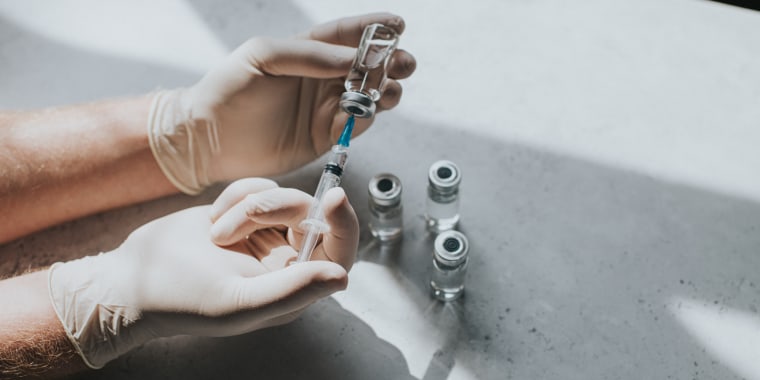Pregnant women who received an experimental vaccine from Pfizer for a respiratory virus called RSV passed their protective antibodies on to their newborns, according to research published Wednesday in the New England Journal of Medicine.
What’s more, Pfizer’s researchers found that those antibodies appeared to provide the infants with a high level of protection against severe illness from the virus, according to an analysis conducted after a portion of the company’s clinical trial was completed.
RSV, or respiratory syncytial virus, usually causes mild, cold-like symptoms in adults. But in young children, it can sometimes cause severe disease: An estimated 58,000 kids under age 5 in the United States are hospitalized with RSV each year, according to the Centers for Disease Control and Prevention.
There are currently no approved vaccines to prevent RSV infection, in adults or children.
Synagis, a monoclonal antibody injection, has been approved for use in the U.S. to prevent severe illness, but it’s only available for certain high-risk infants, like babies who were born prematurely or have a low birth weight.
Another monoclonal antibody injection for newborns, made by AstraZeneca, was recently shown in clinical trials to be nearly 75 percent effective at preventing lower respiratory infections from RSV.
While monoclonal antibodies and vaccines both equip the body with antibodies to fight the virus, monoclonal antibodies are usually more expensive and typically more difficult to administer than vaccines, and are usually given in a hospital instead of a pharmacy, experts say.
A tool that can be used more widely — like a vaccine — is needed because many children who become severely ill with RSV do not have an underlying illness, said Dr. William Schaffner, an infectious disease expert at the Vanderbilt University Medical Center who was not involved with the research.
Antibodies from mother to baby
Pfizer’s experimental vaccine aims to prevent RSV infections with technology commonly used in vaccines for hepatitis and shingles. Clinical trials with the vaccine, called RSVpreF, were conducted in the U.S., Chile, Argentina and South Africa.
However, during the pandemic, RSV circulation decreased in the Southern Hemisphere, and therefore results from that region are limited and remain incomplete.
The company’s interim analysis included only participants from the U.S., which continued to see high levels of RSV throughout the pandemic. That included more than 400 healthy pregnant women ages 18 to 49 who received either the vaccine or a placebo.
The researchers found that the vaccine generated antibodies in the women’s blood that were then transferred across the placenta to their babies, according to the report.
Further analysis found that five infants in the placebo group developed RSV-associated lower respiratory tract infections. Three of these cases were severe, and two infants were hospitalized and had to receive oxygen.
By comparison, three infants in the vaccine group also developed this infection, one of whom had a severe case but was not hospitalized.
The findings suggest the vaccine “has the potential to protect infants from RSV infection well into their first 6 months of life,” the researchers wrote.
Dr. Bill Muller, an infectious disease physician at Ann & Robert H. Lurie Children’s Hospital of Chicago, said that while the findings sound promising, he would like to see data on exactly how long the protection lasts — whether that be a year or a year and a half or more.
“RSV is such a common virus that many people will have immunity to it, but that protection doesn’t last very long,” said Muller, who was also not involved with the new research.
Schaffner, of Vanderbilt University Medical Center, agreed that more data is needed, adding that antibodies passed on from mothers to infants during pregnancy, in general, can last six to eight months.
It remains to be seen if these antibodies from vaccination are “more persistent” or not, he said.
Women participating in the study were given an electronic diary to help researchers monitor for any potential side effects caused by the vaccine.
This story originally appeared on NBCNews.com.
Related:
